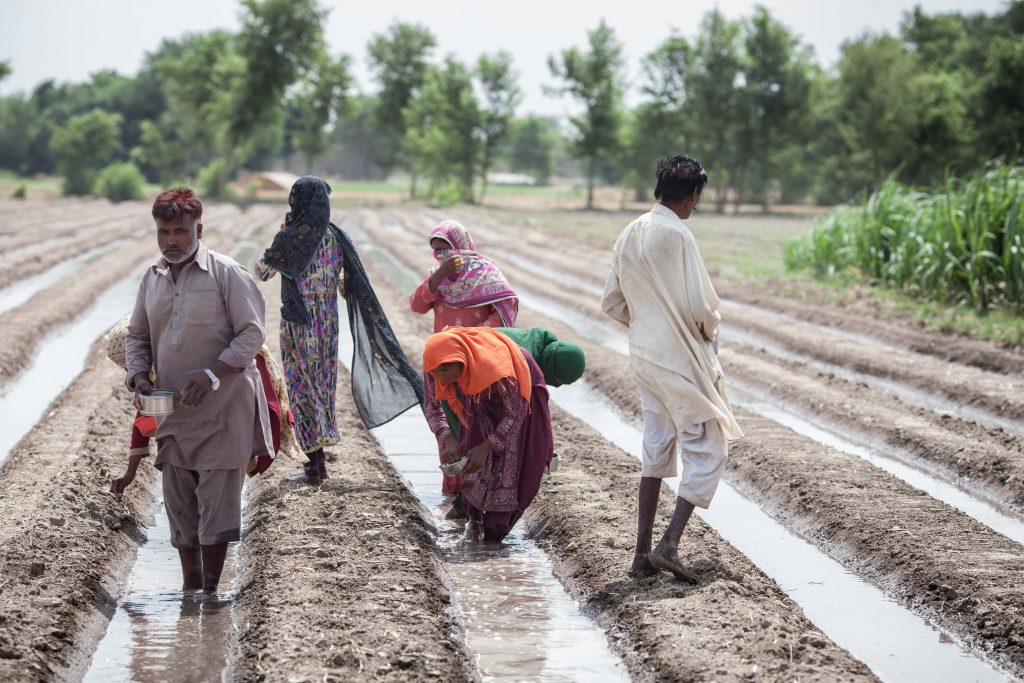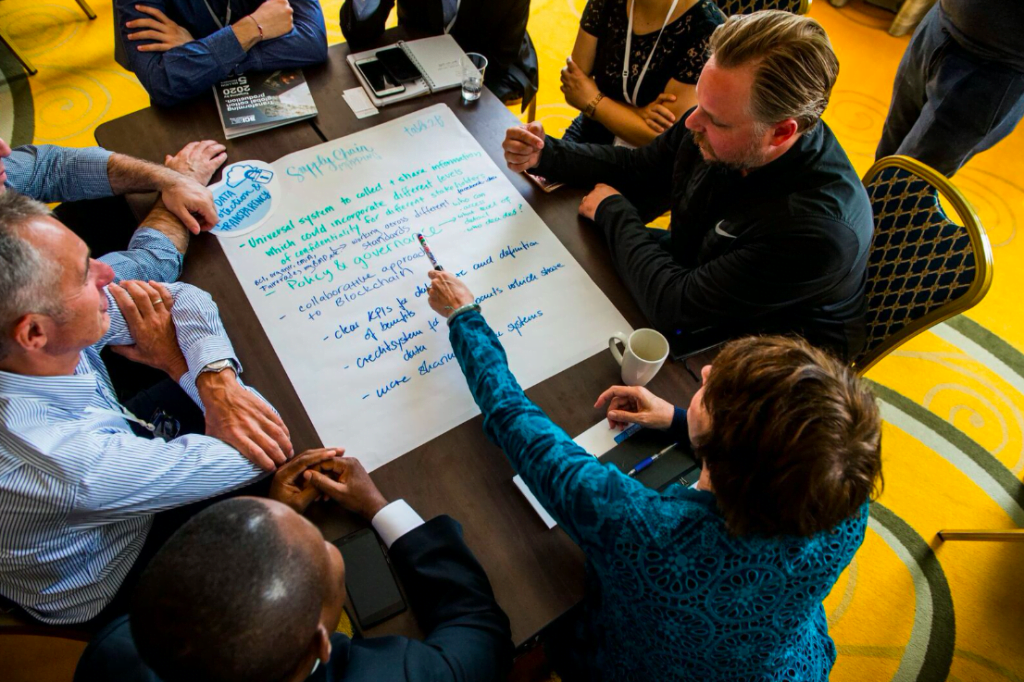Helping Better Cotton Farmers in China Conserve Water and Raise Yields Despite Extreme Weather
Helping BCI Farmers in China Conserve Water and Raise Yields Despite Extreme Weather
Read moreHelping BCI Farmers in China Conserve Water and Raise Yields Despite Extreme Weather
Read more“Precision irrigation and water-saving techniques are becoming more important as water scarcity concerns rise. The Better Cotton Initiative and Cotton Australia are helping farmers raise their yields, improve their resilience to extreme weather and protect the environment.” Rick Kowitz, Cotton Australia, 2019
Read moreBCI works with on-the-ground partners and cotton farmers around the world to address critical water challenges in cotton production.
Read more
The United Nations Industrial Development Organisation (UNIDO) has launched a multi-stakeholder pilot project in Egypt, to train cotton farmers on the Better Cotton Initiative’s holistic approach to sustainable cotton production. The pilot comes as part of a renewed drive in the country to increase sustainability and improve conditions for Egyptian cotton producers.
Funded by the Italian Agency for Development Cooperation, the project is implemented by UNIDO in collaboration with the Ministry of Trade and Industry, the Ministry of Agriculture and Land Reclamation as well as with local and international textile private sector stakeholders. The Better Cotton Initiative (BCI), in coordination with selected Implementing Partners, will support UNIDO on the activation of the pilot in select areas inEgyptduring the 2018-19 cotton season. BCI will provide guidance, share knowledge, develop materials and provide relevant agricultural and cotton experts.
Approximately 5,000 smallholder cotton farmers will be involved in the initial pilot project, receiving training on the Better Cotton Principles and Criteria. By adhering to these principles, existing (licensed) BCI Farmers around the world produce cotton in a way that is measurably better for the environment and farming communities.
“BCI supports all initiatives that seek to make cotton production more sustainable. Egyptian cotton is long staple cotton grown by smallholder farmers. Making the Better Cotton Standard System accessible to smallholder farmers is BCI’s priority – 99% of the farmers BCI works with today are smallholders,” says Alia Malik, Director of Implementation at BCI.
Once thepilotis complete, and in coordination with relevantEgyptian governmental entities and private sector stakeholders, UNIDO and BCI will explore the possibility of supporting the start-up of a direct BCI Programme inEgypt.
Read moreThe Better Cotton Initiative has worked with field-level partner, WWF Pakistan, for a decade to help farmers produce cotton in a more sustainable way.
Read more
In 2018, the Better Cotton Initiative (BCI) experienced a historic level of uptake1as 93 Retailer and Brand Members sourced more than one million metric tonnes of Better Cotton – that’s enough cotton to make approximately 1.5 billion pairs of jeans.
Better Cotton uptake increased 45% on the previous year, and at the end of 2018, retailer and brand member sourcing of Better Cotton accounted for 4% of global cotton consumption2. By integrating Better Cotton into their sustainable sourcing strategies and increasing sourcing commitments year-on-year, BCI’s Retailer and Brand Members are driving demand for more sustainable cotton production worldwide.
Now, to continue to accelerate the mainstreaming of Better Cotton and hit BCI’s 2020 targets – to reach and train 5 million cotton farmers and have Better Cotton account for 30% of global cotton production – BCI needs the next wave of sustainability leaders to come on board and close the gap between supply and demand. (In the 2017-18 cotton season, Better Cotton is forecast to account for 19% of global cotton production.)
Founding BCI Member, H&M group, has played an integral role in the growth of Better Cotton; in 2018 the retailer sourced the largest volume of Better Cotton (for the third year running). ”Cotton is one of H&M group’s most important materials – BCI plays a key role in our goal towards using only sustainably sourced cotton by 2020,” says Mattias Bodin, Sustainability Business Expert, Materials and Innovation at H&M group.
adidas is another founding member with ambitious sustainable sourcing targets. In 2018, adidas sourced 100% of its cotton as more sustainable cotton. Ebru Gencoglu, Senior Manager, Merchandising and Sustainability at adidas commented, ”BCI and adidas have worked closely from the beginning to reach this ambitious goal. BCI has engaged actors throughout the supply chain to enable the right amount of supply in the right locations. This has helped our suppliers to source cotton as Better Cotton, which allowed us to ramp up sourcing in a short period of time.”
BCI’s demand-driven funding model means that retailer and brand sourcing of Better Cotton directly translates into increased investment in training for cotton farmers on more sustainable practices. For example, in the 2017-18 cotton season, BCI Retailer and Brand Members, public donors and IDH (the Sustainable Trade Initiative) contributed more than ‚Ǩ6.4 million, enabling more than 1 million farmers across China, India, Mozambique, Pakistan, Tajikistan, Turkey and Senegal to receive support and training*.
ALDI South Group are among a group of new BCI Members who will help to increase uptake of Better Cotton in 2019 and beyond. Katharina Wortman, Director CRI at ALDI South Group said, ”ALDI supports sustainable cotton standards in their aim to ensure improved farming conditions and reduced environmental impacts. ALDI joined BCI at the end of 2017, and we foresee that BCI will play a significant role in our approach to responsibly sourced cotton. The mass-balance chain of custody system used by BCI enables our supply chain partners to more easily source Better Cotton.”
A member that has illustrated how to scale uptake of Better Cotton rapidly is Gap Inc. The retailer joined BCI in 2016 and is now among the top five BCI Retailer and Brand Members based on total Better Cotton sourcing volumes. ”Better Cotton sourcing is an important part of Gap Inc.’s sustainability strategy. We have been able to leverage our scale across our portfolio of brands to accelerate sourcing of Better Cotton in a relatively short time,” said Agata Smeets, Director, Sustainability Sourcing Strategy at Gap Inc.
As well as increased investment in farmer training and capacity building, uptake of Better Cotton sends a clear signal to the market and has an impact throughout the supply chain. Cotton traders are seeing the increased demand for more sustainably produced cotton but believe there is much more to be done. Marco Baenninger, Head Trader Hand Picked Cotton at PaulReinhartAG said, ”Better Cotton has become an integral part of the international cotton trade. It’s very pleasing to see that uptake from retailers has increased strongly over the last few years. However, there is still a lot to do. Some organisations are still skeptical, but in the long-term they risk losing market share if they overlook more sustainable options. That says a lot about the success of BCI and other sustainable cotton initiatives and standards in promoting sustainably produced cotton.”
Transforming cotton production worldwide requires commitment and collaboration from the entire cotton supply chain. As we celebrate BCI’s 2018 sourcing milestone, we thank all of our members and partners for supporting BCI. The retailers and brands, cotton traders and spinners who sourced the highest volumes of Better Cotton in 2018 will be revealed in the Better Cotton Leaderboard, launching at the 2019 Global Cotton Sustainability Conference in Shanghai in June.

The 2019 Global Cotton Sustainability Conference will bring the entire sector together on 12 – 13 June, to shape a more sustainable future for cotton. Join industry leaders and experts in Shanghai for an interactive opportunity to explore topics at field level, in the supply chain and in consumer-facing business.
The scope of the annual conference hosted by BCI has been enhanced this year, and BCI is collaborating with other sustainable cotton standards and initiatives – including Organic Cotton Accelerator, Textile Exchange, Cotton Made in Africa, Fairtrade International and Cotton Australia – to develop the agenda.
Confirmed speakers represent the entire cotton supply chain, from cotton farms to retail giants. Join us and hear from many great speakers, including: Christophe Roussel, Executive Vice President at GAP Inc.; Almas Parveen, BCI Field Facilitator and Farmer, REEDS; Daniel Gustafson, Deputy Director-General (Programmes) at the Food and Agriculture Organisation of the United Nations (FAO); and Anita Chester, Head of Sustainable Raw Materials, C&A Foundation.
You can look forward to thought-provoking sessions, including:
Keynote sessions
Plenary panel discussions
Breakout sessions
The conference is sponsored by many globally renowned organisations. We have a variety of sponsorship packages available, please contact [email protected] for more information.


Helping BCI Farmers to Adopt Sustainable Agricultural Practices in the Face of Extreme Weather
Read moreThis year BCI turns 10 years old.Over the course of the year,we will be publishing a series of articles, with input from key stakeholders who have been influential throughout BCI’s first decade – from partners, to civil society organisations, to retailers and brands.
Read more
The Better Cotton Assurance Programme is a key component of the Better Cotton Standard System. It involves farmers participating in a continuous cycle of learning and improvement, and it forms the central mechanism for assessing whether farmers can grow and sell Better Cotton.
The Better Cotton Assurance Programme protocol has recently been updated to include some minor clarifications. The updates in Version 3.1 include the following:
The Better Cotton Assurance Programme protocol V3.1 can be found on the Assurance Programme pages of BCI’s website.
Please send any questions or feedback to [email protected].
Read moreThe Better Cotton Assurance Programme is a key component of the Better Cotton Standard System. It involves farmers participating in a continuous cycle of learning and improvement, and it forms the central mechanism for assessing whether farmers can grow and sell Better Cotton.
The Better Cotton Assurance Programme protocol has recently been updated to include some minor clarifications. The updates in Version 3.1 include the following:
The Better Cotton Assurance Programme protocol V3.1 can be found on the Assurance Programme pages of BCI’s website.
Please send any questions or feedback to [email protected].
Read moreBCI’s Founding CEO, Lise Melvin, worked with a dedicated team for seven years to transform the Better Cotton Initiative (BCI) from an idea into a reality.
Read more